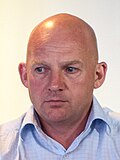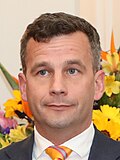| Leader of ACT New Zealand | |
|---|---|
| | |
| Type | Party leader |
| Formation | 1994 |
| First holder | Roger Douglas |
| Deputy | Deputy Leader of ACT New Zealand |
| Website | https://www.act.org.nz |
The leader of ACT New Zealand is the highest-ranked political position within ACT New Zealand. The current leader is David Seymour, who became the leader in October 2014. He is the longest serving Act Leader, serving more than 10 years as of 2024.
Contents
The leader is appointed by the party board. The leader is not required to be a member of parliament; when the leader is a member of parliament, the party constitution states that the leader is responsible for "the supervision, co-ordination and conduct of the Party’s activities in Parliament." [1] The leader serves until they resign or the board removes them.
The party leader and deputy party leader are ex officio members of the ACT board. The board consists of a maximum of thirteen members, consisting of regional representatives, party MPs, the party president, party vice-president, the party treasurer, and others at the discretion of the board. [2]








